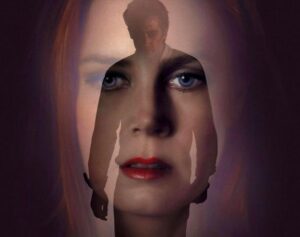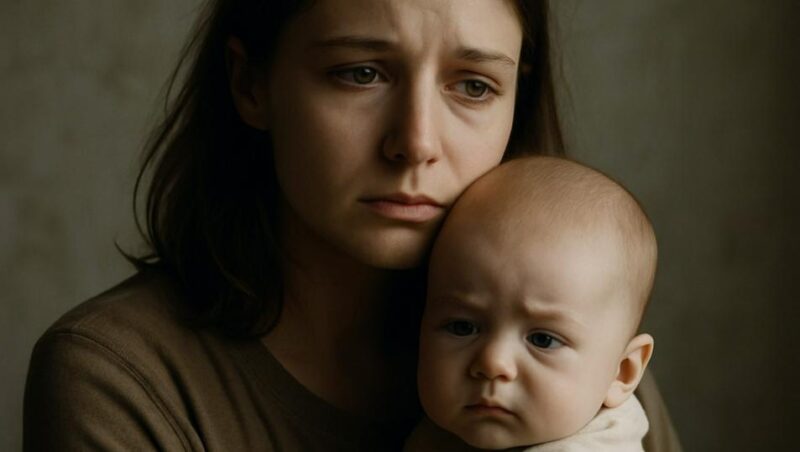What is this? A girl? I was expecting a son!”
“Sasha, that’s our daughter…”
His words stabbed me like a sharp blade. Exhausted and still struggling to breathe after childbirth, I cradled the tiny, warm body of my newborn with her wrinkled little face. Yet he stood there, motionless, as if a stranger—unmoved, distant, not a father but a passerby.
Moments earlier, I had felt like a joyful mother soaring on wings. Now, I was left hollow, an empty shell. Aleksander’s face had turned cold and unfamiliar; the gentle expression I once knew had vanished.
“You were supposed to give me a son. So what now? Do you expect me to support two girls?” he hissed.
“We can manage without you, Sasha. Just be with us. Please…”
The silence that followed was as heavy as concrete. He didn’t come closer; he refused even to glance at our baby. Instead, he stared beyond us, through us.
“You couldn’t even handle this,” he said icily. “Without a man, you’re nothing. I’m leaving.”
Without a backward glance or a single word, he turned and walked away, as if I hadn’t just given birth to his child but had scratched his car.

Soon after, a nurse came silently, handed me a tissue, and took the baby away. I sat motionless, staring into emptiness. Just yesterday, Aleksander had kissed my belly and picked out names. Today, he disappeared, taking a piece of me with him.
When we returned home, I was shattered while she was a tiny bundle of warmth. Aleksander greeted us with a stony face and started packing without a word.
“You’ll perish here,” he spat through clenched teeth as he stuffed clothes into a bag. “I’ll return in thirty years to see what a mess you’ve made.”
I remained silent, clutching my daughter tighter as my heart pounded heavily in my throat.
At the door stood my grandfather, Stepan Karpovich—a tall, upright man whose eyes suddenly gleamed with steel.
“Take a step, and don’t come back,” he said grimly. “This is my granddaughter’s home and my great-granddaughter’s home. You—you’re no man. You’re trash.”
Frozen, Aleksander scoffed, grabbed his bag, and left without casting a glance at the child. The door slammed so loudly that our wedding photo fell from the wall, glass shattering like my life.
Grandfather sat beside me, placing his wrinkled hand on my shoulder:
“Cry it out, Nastya. Then get up. Life doesn’t wait.”
I looked down at my tiny daughter—so small, so defenseless—and already fatherless. My tears streamed down, but inside, something new began to form: a fiery, tough determination.
“I will repay him,” I whispered, kissing my daughter’s forehead. “Not with fists, but with my life.”
Grandfather nodded, as if he understood everything.
“What shall we name her?” he asked.
“Małgorzata. Let her be Rita.”
“A flower. Strong one.”
The early days were challenging: endless feedings, exhaustion, sleepless nights. Yet grandfather was my rock—bringing groceries, chopping wood, tending the stove. He rarely spoke, but his presence was steady. One day, he remarked:
“Nastya, you have golden hands. Remember how you used to bake?”
I nodded. Before marriage, I loved playing with dough.
“We’ll start baking again. Sell it. We have a great oven, and I’ll drive to the city.”
That was how it began—with simple bread, made with sourdough using grandma’s recipe. A week later, grandfather came home with an empty basket and money.
“Everything sold out. People said it tasted like childhood.”
I started baking more: rolls with poppy seeds, raisins, and marmalade. My hands remembered the craft; dough once again healed me.
Meanwhile, Rita grew peacefully, somehow sensing her mother’s need to heal. Grandfather built her a cradle that stood by me while I baked.
Gradually, regular customers appeared. After two years, orders increased steadily. By Rita’s fourth birthday, I was baking pies, pastries, and even French croissants. Then grandfather suggested:
- Opening a proper bakery with a real oven.
I was afraid. It was a huge leap—money, responsibility.
“You are no longer a girl,” he said. “You’re a master. The whole region talks about your baking.”
We took a loan, hired staff, and bought equipment. I studied, listened, and took notes. The bread kept selling better and better. People came from far away.
Rita blossomed too—slender, with brown hair and wise eyes. She walked through the village with a basket, handing out rolls. Grandmothers waved, calling her:
- “Our little sunshine!”
No longer did I weep. A silent scar remained, reminding me softly.
On Rita’s sixth birthday, we moved into a new house—spacious, bright, with a garden and animals. Customers came for our cheese and herb buns.
One day, a stranger arrived—tall, eyes smiling.
“I heard you have the best bread here.”
“Please, try some,” I offered.
That was Piotr, a mechanic. He started helping—carrying, fixing.
“It smells of forest and metal,” Rita said. “When he’s near, I feel calm.”
We married quietly—just honestly, simply.
“He’s not a replacement,” I told Rita. “He just walks beside us.”
“He looks at us like a miracle,” she replied.
Piotr became part of our family—without fanfare, with kindness and care.
The bakery expanded. Rita grew too. By age ten, she knew she wanted to be a doctor.
“You heal souls with bread,” she said. “I want to heal bodies. Together.”
She left for university with honors, carrying mums’ baked goods. I watched her leave, proud.
Thirty years passed. I stood in my apron, amid work, as always.
The gate creaked open. An old man entered—stooped, tired, smelling of alcohol and past regrets.
“Nastya… is that you?” he croaked.
It was Aleksander—the same. I recognized his voice.
“I came back. Wanted to see how you…”
“You wanted to check if I fell? Look.”
He looked—at the house, bakery, garden; at the life I had built.
“You did well…”
“Not for revenge. For myself. For Rita. I promised—and I delivered.”
He reached for bread. I didn’t give it. Then, I handed him two loaves.
“Take these. And go. You have no place here anymore.”
He left—bent, broken, like a fading memory and a hard-earned lesson.
Rita emerged, beautiful in her medical coat.
“Who was that?”
“A ghost. Now gone.”
She embraced me silently, understanding everything.
That evening, Piotr and I sipped tea on the porch. Outside, the sunset. Behind us, life.
“I saw him,” Piotr said. “I was nearby. If needed—I would have stepped in.”
“I know. You’re always beside me.”
“You’re not just strong—you’re unstoppable.”
I leaned into him, as Rita’s confident, mature doctor’s voice echoed gently from the house.
“She’s found her path,” I said.
Later, neighbors gathered, laughter filled the air, the smell of bread and preserves warmed everything.
“You know,” I told Rita, “I once thought the best revenge would be a beautiful life.”
“And now?”
“Now, revenge isn’t needed anymore. I’m simply happy. And that is more valuable than anything.”
In conclusion, this story recounts the despair of rejection, the power of resilience, and the triumph of building a new life filled with love, determination, and success. Despite the initial humiliation and abandonment by her husband, the protagonist found strength through her family, her passion, and unwavering spirit, ultimately achieving fulfillment and happiness on her own terms.
